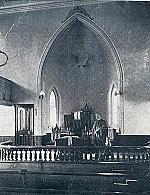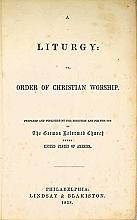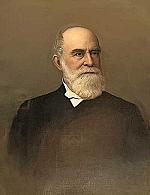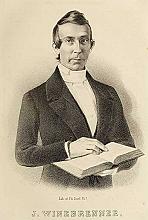Revival, rightly understood?
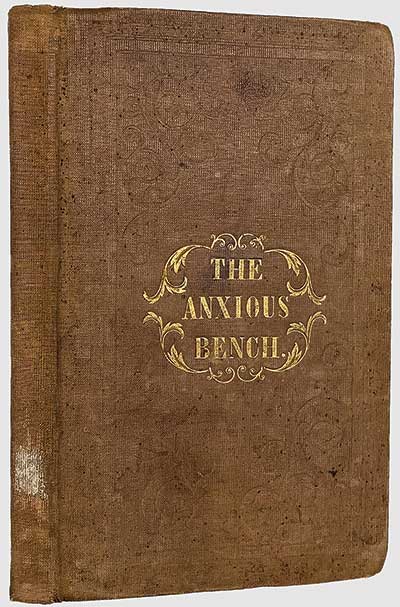
[John W. Nevin, The Anxious Bench, Second Edition, 1844. Chambersburg, Pennsylvania. The German Reformed Church—Specs Fine Books]
In this edition of The Anxious Bench (1844), Nevin critiqued revivalism as shallow, compared to the steady ongoing life of the church. Though fierce in his assessment, he supported true revival as a beautiful consequence of faithful teaching within the church.
It is proposed to institute a free inquiry into the merits of the Anxious Bench, as it has been used extensively of late years in the service of religion. My object will be to show, that the measure is adapted to obstruct rather than to promote the progress of true godliness, and that it deserves to be discouraged on this account. . . .
It will be understood, that the Anxious Bench is made to stand, in this case, as the type and representative of the entire system of what are technically denominated in our day, “New Measures.”. . . It opens the way naturally to other forms of aberration, in the same direction, and may be regarded in this view, as the threshold of all that is found to follow, quite out to the extreme verge of fanaticism and rant. The measure belongs to the system, not in name simply, but in its life and spirit. At the same time, it is the most favorable aspect, in which the cause of New Measures can be presented to our view. The simple Anxious Bench, as it is often used in a sober way, is the most moderate and plausible shape the system can well take. If this then be found unworthy of confidence, the whole system will be shorn of its title to confidence. —Chapter 1
FAITHFUL PASTOR VS. ZEALOUS LEADER
It is a vastly more easy thing to carry forward the work of religion in this way [through periodic revivalism], than it is to be steadily and diligently true to the details of ministerial duty, as prescribed by the apostle Paul…to be known in the family visitation, in the sick chamber, in the dwelling places of poverty and sorrow, as the faithful pastor, “watching for souls,” whose every presence serves to remind men of holiness and heaven, not at certain seasons only, but from month to month, from one year always to another; all this is something great and difficult, and not to be compassed without a large amount of inward spiritual strength. But it calls for comparatively little power, for a man to distinguish himself as a leader in periodical religious excitements, where zeal has room for outward display, and wholesale action is employed to discharge within a month the claims of a year. —Chapter 3
THE WATER-SPOUT AND THE SHOWER
It is a most unfair view again of the system of the Catechism, to think of it, or speak of it, as unfriendly to all special and extraordinary forms of action, in the work of the gospel. The system, it is true, makes more account of the regular, the ordinary, and the general, than it does of the occasional and the special; more account of rills, and the perpetually flowing breezes of heaven, than of mountain torrents, water-spouts, and storms. But it does not by any means preclude the presence of what is out of the usual way, or refuse to suit itself to its requirements when it comes. The extraordinary in this case however, is found to stand in the ordinary, and grows forth from it without violence, so as to bear the same character of natural and free power. It is not the water-spout, but the fruitful plentiful shower, causing the fields to sing, and the trees of the wood to clap their hands for joy. Such is the true conception of a Revival. For such special showers of grace, it is the privilege of the Church to hope, and her duty to pray, at all times. . . .
Wherever the system of the Catechism is rightly understood, and faithfully applied, it may be expected to generate revivals in this form; though in proportion to the measure of this faithful use, it may be said, the ordinary and the extraordinary as here distinguished will be found continually coming closer and closer together, till in the end they may appear almost identical, and the church shall seem to bask, as on the “Delectable Mountains,” in the perpetual sun-height of heaven itself. —Chapter 7
By John Williamson Nevin
[Christian History originally published this article in Christian History Issue #155 in 2025]
John Williamson NevinNext articles
Mercersburg’s “worship war”
Crafting a new liturgy for the German Reformed Church created conflict, but also a lasting legacy
Walter L. TaylorMystic, sweet Communion
Excerpts from the liturgy for Holy Communion from the provisional Mercersburg liturgy of 1857
German Reformed Church in the United States of AmericaCentering Jesus
Emanuel Vogel Gerhart, a student of Mercersburg, became one of its key advancers
Annette G. Aubert



